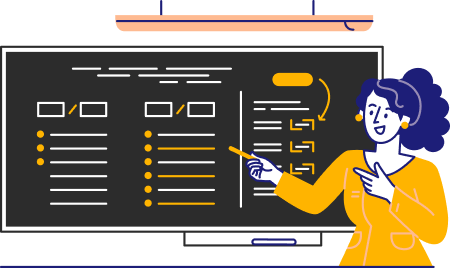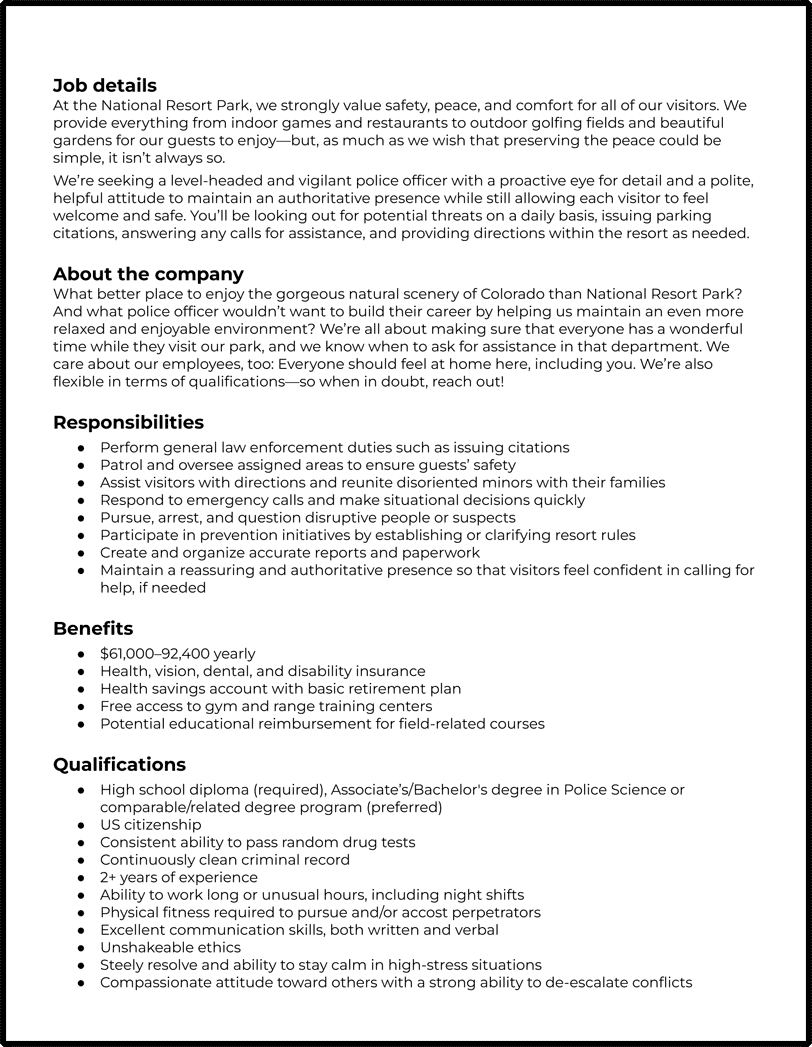We understand that you’re reading this because you want to help others by making your community safer—an exciting goal! You’re undoubtedly looking for a police officer who shares your strong sense of ethics while offering the resilience, critical thinking, and adaptability that are required for all police officers. You may need someone to help strengthen general community support with outreach and crime prevention programs, or you might need a more specialized officer who can handle intense tasks like crime scene investigations and suspect interrogations.
In order to help you find the next addition to your dream team of skilled, courageous, and quick-thinking police officers, we’ve put together three sample job descriptions for different positions within the police force. And to give you even more inspiration, there’s also a handy outline and a handful of tips to follow!
Write an Unflinching Police Officer Job Description

Sadly, many police officer job descriptions fail when they’re needed most—they’re too generic and don’t provide candidates with a clear enough understanding of what the role entails. Many civilians don’t fully grasp how diverse the police force really is, but the type of applicant you want will have lots of questions in mind! What type of area will they be working in? How high-risk is the daily job role? Will they need to shoulder the responsibility of intense interrogations or top-secret info?
Definitely mention niche details, but don’t get overly simplistic with the basics: Phrasing like “the usual police qualifications,” will leave quality candidates scratching their heads and wondering if you’re serious, instead of sending in their police officer resumes. Alongside nailing the optimal length for your job description, make sure you proofread and check the formatting for consistency. Again, you want to attract detail-oriented applicants, not leave them rolling their eyes as they scroll past your job description!

Know who you need on your force and why
When you write your police officer job description, recall what motivated you to start looking in the first place. Is your business or facility facing a sharp increase in security issues? Are crime rates in your area rising? Make sure you consider the reasons behind your job ad, and these will guide you to the perfect details to attract the right person for the job.
- If you’re currently seeking a new addition to your task force, then you’re undoubtedly hoping to find an officer who’s dependable, brave, and relentlessly upstanding. But does the tone of your job description set the right stage for your prime candidate’s grand entrance?
- You obviously want to hire a police officer who’s honest and communicative: Do you demonstrate similar qualities by clearly listing salaries, benefits, risks, and job expectations?
- You may need to hire a more specialized officer with fine-tuned qualifications who jives with your work environment, but do you provide the details they’ll need to determine whether they’re the right fit?
- Do you have a high-stakes role that requires a hire with ample experience? Make sure you write a comparably thorough job description that focuses on more advanced skills and benefits!

Proofread and edit for a tiptop job description
Ugh—it’s so tempting to list every single quality you’re looking for in the next ideal member of your team. There’s so much to consider while picking only the best to join your forces: on top of basic police requirements like drug testing and the ability to surpass training thresholds, there are enough unit-specific details to make anyone’s head spin.
Do you focus on community outreach and security in residential areas? Or do you need an experienced detective to handle evidence and investigations? Prioritize these types of details in your job description—and always proofread before posting it for the world to see. Make sure you include minimum requirements alongside more advanced details that are specific to the role, too: you can reduce clutter in your job description by highlighting the “common denominators” concisely—but keep the most important ones!
Get Moving by Outlining Your Police Officer Job Description

Now that you’ve gotten a feel for how your police officer job description could look and checked out some handy tips, let’s break things down into an outline to get things moving!

Job details
Circle back to your original reasons for writing your job description if you get stuck here. Police officers cover a lot of ground, so you’ll have to tailor your job listing to suit your individual needs.
Use simplistic language when possible to polish up a quick, efficient read. Look to your organization’s mission statement for core values to touch upon, and specify a couple of things that your new police officer will do each day—such as whether they’re more likely to conduct investigations at their desk or rush out to pursue criminals.

About the company
Offering a good glimpse into your organization’s culture and values is essential: candidates want to be able to look at what your business is all about to really decide if they’re the right fit before applying.
Does your organization pride itself on outreach programs that strive to help extremely underprivileged areas, which may require protection for your staff? Do you want to ensure that visitors to your public garden or park feel safe and secure? When you answer these questions yourself in your job description, applicants can feel confident in what they’re signing up for.

What you’ll be doing
A requirements section by any other name is still the same. No matter what you call it, this section needs to pack a punch while still being easy to digest. This is the section all applicants should read first. Here is where they’ll glimpse the framework of responsibilities they’ll undertake. Avoid making this a huge list of tiny tasks or long sentences full of prose. No need to sound grandiose; that won’t help them understand their tasks. Keep it simple and relatively short.
- Respond to emergency calls efficiently and make situational decisions quickly
- Pursue, arrest, and question criminals or suspects
- Testify in court settings

Qualifications
After requirements, this is the section your applicants will look at first. It should be detailed but realistic. The goal is to show them what they really need to do the job. Talking to employees is crucial here, as they’ll give you the full scope of what is actually necessary. Some things are easily learned through training, while others take previous experience to fully master. As you write, remember that your ideal applicant might not have all the credentials of your dream hire, but it’s far more important that they’re committed to the company and driven to learn.
- 4+ years of experience
- Ability to consistently pass random drug testing
- Excellent written and verbal communication skills
- Ability to work long or unusual hours with a willingness to remain on-call

Benefits
If a skilled and honorable individual is prepared to put themselves on the line each day, hopefully, you have some nice benefits lined up for them! Listing key benefits upfront in your job description not only demonstrates transparency and honesty—it shows that you respect potential hires enough to promise them the equipment and care they deserve right off the bat.
You’re undoubtedly planning to provide the newest member of your police force with health insurance—ideally including dental, vision, and more when possible. Are there any other perks you can offer that set your organization apart, like educational payment plans, catered appreciation events, or special equipment provisions?
Tasks and Responsibilities Inside the Police Officer Beat

As you know, a police officer’s duties can be far more varied than many people think—so you’ll have to specify what you need! Here are a few different roles within the police force that you might be able to use as a starting point for your own job description:

Maintaining order
- Not all police officers operate at a federal or state level: some step in when specific city guidelines are violated. For instance, what if it’s time for a city’s seasonal festival to open, but someone’s parked a big truck in an off-limits zone which would obstruct traffic flow at the entrance?
- Issue citations, organize accurate reports, and file paperwork
- This scenario not only requires situational awareness to spot the traffic obstruction, but a few judgment calls as well—Is this a ticket or towing situation? This role also requires specialized knowledge of city laws, common local problems, and de-escalation.

The bloodhound
- Sometimes, people simply defy local police officers and skulk off into the shadows, hoping to skip town and evade the consequences of their crimes—possibly major crimes! A sheriff’s jurisdiction covers their entire county, so they may be an ideal fit for the “Bloodhound” role, stepping in to handle major offenses or apprehend someone who’s on the run.
- Detain offenders and potentially neutralize hostile/threatening perpetrators
- The Bloodhound must be level-headed and utilize incredible critical thinking skills and problem-solving abilities alongside a good knowledge of local routes. They must also exhibit dogged determination and be physically and mentally equipped to engage in a stressful or combative takedown, should someone resist arrest.

The strategic neutralizer
- What if a business chain is suspected of money laundering or drug trafficking? The average person won’t be able to stop it, but big-time federal crimes like this are exactly what “Strategic Neutralizers” are there for. These officers can conduct investigations and interrogations alongside gathering the necessary evidence for a takedown, spotting red flags with ease and putting together all the puzzle pieces necessary to solve a case.
- Carry out covert, private, or undercover investigations centered around specific suspects
- Skills with surveillance and research technology like computers are a must for this role, as are interpersonal abilities. Strategic Neutralizers must also be highly adaptable to unexpected situations, thinking on their feet with fearlessness and quick judgment calls.

Peacekeeper
- The police force’s duties continue far beyond the apprehension and conviction of a lawbreaker. What happens when a fight breaks out in a prison cafeteria? What about attempted escapes? “Peacekeepers” must be ready to restore and maintain order among the incarcerated to keep things low-key and manageable.
- Halt conflicts and other types of misconduct, using appropriate levels of force when necessary to calm and discipline incarcerated persons
- Knowledge of prison regulations and standard disciplinary measures is essential for Peacekeepers. Conflict resolution, observational skills, physical fitness, vigilance, compassion, and diplomacy are also key in this role.

The preservationist
- What if someone’s been driving to a large, beautiful conservation park and using it to hunt, not only disrupting wildlife populations but interfering with the natural ecosystem by scaring off other animals with gunshots? Officers who act as “Preservationists” can help protect natural resources and enforce local regulations, including fish and game restrictions.
- Respond to calls and investigate claims of fishing or hunting violations
- Technical knowledge of the ins and outs of the local ecosystem and related laws will help reinforce the necessary decision-making abilities that Preservationists, such as Environmental Police, use to determine whether there’s a threat to the local flora and fauna.

Evidence analyst
- Unfortunately, sometimes the worst-case scenarios can’t be stopped, despite all the valiant efforts made by other law enforcement officers. If someone calls in about a break-in, assault, or robbery that’s already happened, then an “Evidence Analyst” will be the one to help tie up loose ends and bring the perpetrator to justice.
- Collect evidence at on-site crime scenes and transport it safely for analysis
- Testify in court, providing easily-understood summaries of results and conclusions
- An Evidence Analyst will need to conduct plenty of research, making an analytical and detail-oriented mindset critical for their role. This type of officer will also usually show up to collect evidence safely and add it to the assembly of info. needed to track down a suspect, requiring a keen eye and a delicate hand. They also often participate in interrogations, raids, and finally, arrests.








